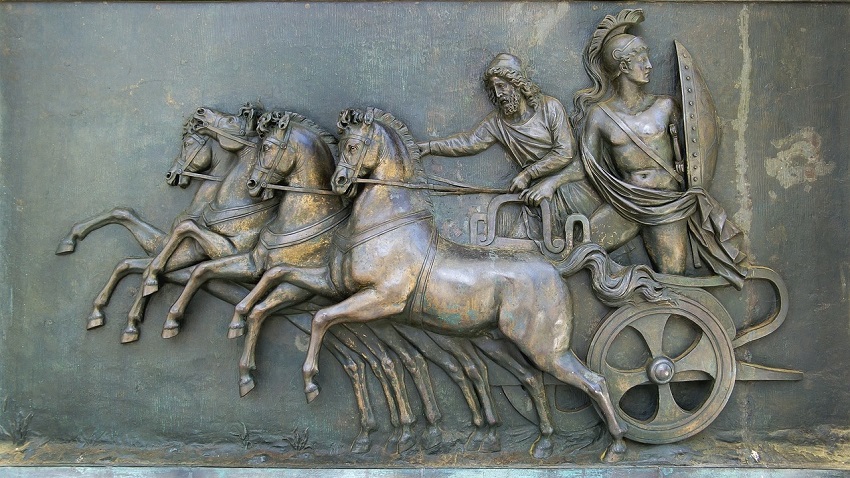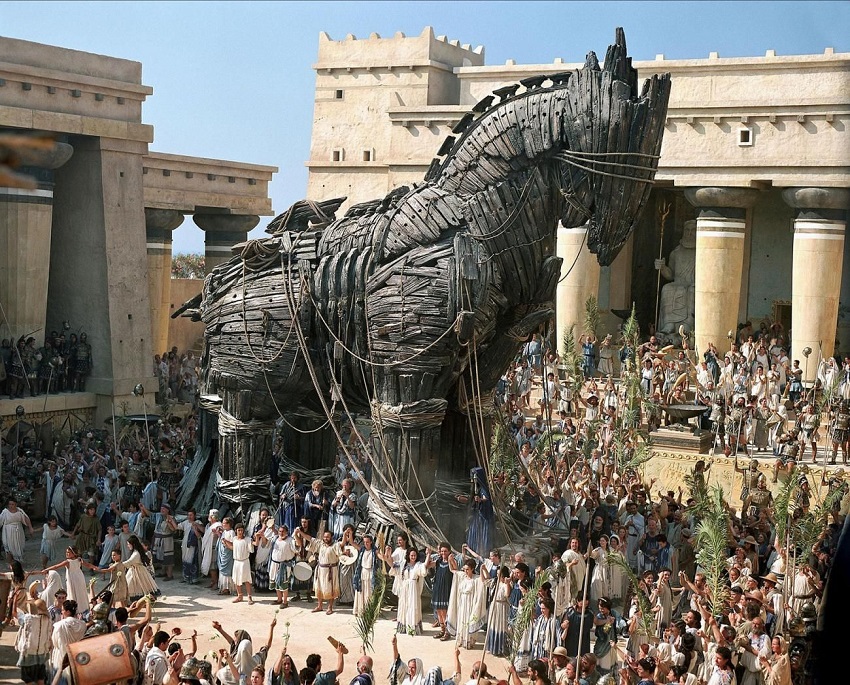The Trojan Horse has made its way into pop culture as a symbol of deception and hidden agendas, transitioning from its origins in ancient art to the realm of internet memes. The rise of this iconic image showcases how cultural references can evolve and adapt in the digital age, bringing with it a new wave of creativity and humor.
From humorous photoshopped images to cleverly crafted captions, the Trojan Horse meme serves as a reminder that even within the realm of entertainment, there may be deeper messages and meanings lurking beneath the surface. Join us as we explore the journey of the Trojan Horse from its historical significance to its current status as a beloved meme in pop culture.
1. The Evolution Of The Trojan Horse
The Trojan Horse is a legendary symbol that has made its way from ancient art and literature to popular culture today. Its mythical origins can be traced back to Ancient Greece, where it played a pivotal role in the Trojan War. The iconic image of the Trojan Horse is depicted in various artworks and literary works, becoming an enduring symbol of deception and trickery.
Over time, the Trojan Horse has transitioned from art to popular culture, appearing in different forms such as memes and references in TV shows and films. Its significance as a meme lies in its ability to represent the idea of hidden dangers or secrets. The Trojan Horse has become a metaphor, used to describe situations where something or someone appears harmless or benign but actually poses a threat.
This evolution of the Trojan Horse in popular culture showcases the enduring power of ancient symbols and their ability to resonate with modern audiences. It serves as a reminder of the lasting impact that art and mythology can have on our collective consciousness.
2. The Trojan Horse As A Metaphor
The Trojan Horse metaphor has been widely used in various forms of popular culture, transitioning from art to memes. A metaphor is a figure of speech that implies a comparison between two concepts or objects that are not literally related.
In historical contexts, the Trojan Horse metaphor refers to the deceptive strategy employed by the Greeks during the Trojan War, where they hid soldiers inside a giant wooden horse to gain access to the city of Troy. This metaphorical usage portrays a trick or strategy that allows an enemy to infiltrate a secure place by hiding malevolent intentions behind an innocuous exterior.
In popular culture, the Trojan Horse metaphor has been employed in various ways. For example, in film and television, it is often used to depict a character or situation that appears harmless or helpful but conceals a hidden agenda or ulterior motives.
| Examples of the Trojan Horse metaphor in popular culture: |
|---|
| 1. The character Loki in Marvel’s Avengers films is portrayed as a literal Trojan Horse, appearing as a friendly ally but eventually revealing his true intentions. |
| 2. The plot twist in the TV series “Westworld,” where seemingly innocent hosts turn out to be programmed to revolt against their human creators. |
| 3. The concept of “clickbait” articles or advertisements that lure readers in with a catchy headline but deliver disappointing or misleading content. |

3. The Trojan Horse Meme Trend
Internet memes have become a prominent part of pop culture, and one trend that has gained popularity is the Trojan Horse meme. These memes take the concept of the Trojan Horse, a historical symbol of deception, and apply it to various humorous or ironic situations.
The emergence of Trojan Horse memes can be attributed to the widespread use of social media platforms, where users share and create content that resonates with a wide audience. These memes often feature images or videos with captions that play on the idea of hidden intentions or unexpected outcomes.
Popular Trojan Horse memes often involve clever wordplay or visual puns, adding an extra layer of humor to the concept. By incorporating familiar cultural references or current events, these memes are able to connect with a broader audience.
Analysis of popular Trojan Horse memes reveals the creative and diverse ways in which this trend is interpreted. Some memes focus on political or social commentary, while others take a lighthearted approach, poking fun at everyday situations.
Overall, the Trojan Horse meme trend showcases the power of internet culture to transform historical symbols into relatable and entertaining content that captures the attention of the online community.
4. Impact Of The Trojan Horse Meme
The impact of Trojan Horse memes on pop culture has been significant. These memes have spread rapidly on social media platforms, capturing the attention of users worldwide. With their clever and humorous portrayal, Trojan Horse memes have become a popular form of entertainment, generating widespread engagement and sharing.
Companies and brands have also recognized the potential of Trojan Horse memes in their advertising and marketing strategies. By integrating these memes into their campaigns, businesses are able to leverage the already-established popularity and virality of the memes to reach a wider audience. This approach adds a level of relatability and humor to their marketing efforts, making it more likely for consumers to engage with their brand and products.
Also Read More:
Sueb: Unveiling the Meaning and Fascinating History
5. The Trojan Horse In Art And Entertainment
Art and entertainment have long been influenced by the iconic Trojan Horse. In TV shows and films, the Trojan Horse is often used as a plot device, symbolizing hidden danger or deceit. Visual arts and galleries also incorporate the Trojan Horse concept, with artists using it to explore themes of deception and infiltration. Literature and music have likewise been influenced by the Trojan Horse, with authors and composers incorporating its metaphorical meaning to depict trickery and subversion. The Trojan Horse has become a cultural icon, with its various interpretations shaping pop culture. From its origins in ancient mythology to its contemporary role as a meme, the Trojan Horse continues to captivate and inspire artists and creators across different mediums.
6. Memes And The Manipulation Of Discourse
|
Understanding the power of memes in shaping public opinion: Trojan Horse memes have gained significant popularity in recent years due to their ability to influence discourse and shape public opinion. These memes serve as a form of political and cultural satire, often using humor to convey a deeper message. By leveraging relatable images or popular characters, Trojan Horse memes can easily engage a wide audience and spread rapidly on social media platforms. Examining the ability of Trojan Horse memes to influence discourse: These memes act as a Trojan Horse, appearing harmless and entertaining on the surface but actually conveying a potent message or critique. They provide a subversive way to challenge established norms, question authority, and spark dialogue around important societal issues. Due to their viral nature, Trojan Horse memes have the potential to reach a massive audience, making them effective tools for influencing public opinion and shaping cultural narratives. Implications and controversies surrounding Trojan Horse memes: While Trojan Horse memes can be a powerful means of expressing dissent and critique, they also come with their fair share of controversies. Some argue that these memes oversimplify complex issues and may contribute to the spread of misinformation or reinforce polarized views. Others contend that they have the potential to promote harmful ideologies or perpetuate harmful stereotypes. As with any form of media, it is essential to approach Trojan Horse memes critically and engage in thoughtful discussions about their implications. |
7. Future Trends In The Trojan Horse Meme Phenomenon
|
Future Trends in the Trojan Horse Meme Phenomenon The evolution and adaptation of Trojan Horse memes in pop culture have seen a significant impact on the creative industry. These memes, known for their clever and deceptive nature, have become a popular form of expression and entertainment. Predictions for the future of Trojan Horse memes in pop culture:
|
Frequently Asked Questions Of From Art To Meme: The Trojan Horse In Pop Culture
Where Did The Trojan Horse Meme Come From?
The Trojan Horse meme originated from a series of photoshopped images with a red arrow pointing at random areas. It became popular on the internet, known as “Trojan Horse Chuu. “
What Is An Example Of A Trojan Horse Marketing?
An example of Trojan horse marketing is when cell phone companies sell customers ringtones, but they unknowingly end up buying many more ringtones over time.
What Is A Trojan Horse Metaphor?
A Trojan horse metaphor refers to any trick or strategy that deceives a target by hiding malevolent intent behind a benign exterior, subverting from within using deceptive means.
Was The Statue Of Liberty A Trojan Horse?
No, the Statue of Liberty was not a Trojan horse.
Conclusion
In the world of pop culture, the Trojan Horse has seamlessly transitioned from ancient art to a modern-day meme. This iconic symbol continues to captivate audiences and infiltrate various forms of media with its deceptive charm. From movies and TV shows to internet memes, the Trojan Horse serves as a metaphorical tool that resonates with individuals and sparks creative expression.
As culture evolves, so does the significance of this timeless concept, making it a fascinating subject that bridges the gap between the past and the present. The Trojan Horse’s influence in pop culture shows no signs of waning, as it continues to inspire and surprise us with its hidden potential.
Explore the depths of this remarkable phenomenon and uncover the artistry and symbolic power behind the Trojan Horse in our ever-changing world of entertainment.
